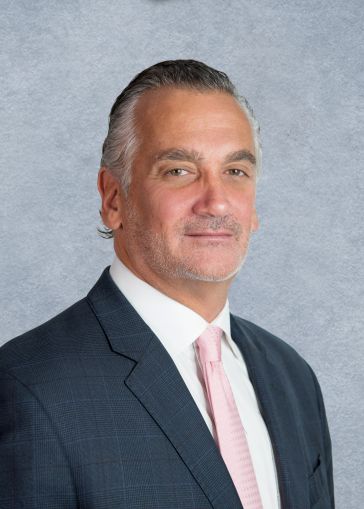Marcus & Millichap’s Evan Denner On Scaling His Business in a Volatile Market
By Andrew Coen July 3, 2023 10:00 am
reprints
Evan Denner has been extra busy since assuming the role of executive vice president and head of business for Marcus & Millichap Capital Corporation (MMCC) in January 2021, overseeing a more than 200-person business in 37 markets while trying to lead a growth trajectory for the brokerage firm amid market headwinds.
Shortly after Denner’s promotion, he helped facilitate MMCC’s new strategic alliance with M&T Realty Capital Corporation aimed at expanding the firm’s agency business. In March, the partnership with M&T surpassed the $1 billion origination mark after closing $1.4 billion of agency financings in 2022 alone.
MMCC, under Denner’s leadership team, closed roughly 2,100 in total commercial real estate transactions from 440 lenders in 2022 for nearly $12 billion in deal volume. Denner, who earned his undergraduate degree at Hofstra University and his Master of Science from Columbia University, arrived at Manhattan-based MMCC after several decades in the CRE profession, including a two-year stint as chief investment officer for merchant banking at Cantor Fitzgerald.
Denner sat down with Commercial Observer to discuss how rising interest rates have impacted MMCC’s deal flow, his experience founding one of the largest student housing companies, and what he expects from the debt markets for the remainder of 2023.
The interview has been edited for length and clarity.
Commercial Observer: Where did you grow up and what was your path to commercial real estate?
Evan Denner: I grew up in central New Jersey and studied marketing in college. When I got out of school I had a friend who was a commercial real estate appraiser and he was working towards his [Member, Appraisal Institute] designation. He introduced me to an appraisal class, and I got hooked on the commercial real estate business then.
What prompted the move to Marcus & Millichap in 2019?
When I was at Cantor Fitzgerald and we were acquiring companies, I spoke to every commercial real estate company out there. We ended up buying Newmark Knight Frank, Grubb & Ellis and Cornish & Carey, but for whatever reason we never really thought about Marcus & Millichap. When they approached me in 2018 I was so impressed by their size, the number of transactions that they had closed, the fact they were No. 1 in many league tables, the number of hospitality transactions they closed and their multifamily retail and credit tenant deals. As much as I transacted with them over my career, I just really hadn’t put two and two together and truly didn’t understand how large and capable they were.
One of your first big moves when you were named executive vice president and head of business in early 2021 was spearheading a strategic alliance with M&T Realty Capital. What was the impetus behind this initiative, and how has the partnership gone so far?
For many years Marcus & Millichap had tried to buy a [delegated underwriting and servicing] license, but there is a finite number of licenses so they had been unable to do that. In 2019, the firm started thinking about how to get a little closer to a license. We hired Beekman Advisors to do a study for us and to start making introductions for us to various license holders, and eventually based on very similar goals that we shared with M&T and business philosophies we ultimately proceeded with M&T Realty Capital Corporation, which is a subsidiary of M&T Bank. So far the partnership has really exceeded expectations. Last year, we closed about $900 million, and this year I suspect we’ll close $1.5 billion to $2 billion with them.
How has the rising interest rate environment affected deal flow for your team during the past year?
Like everybody else, it certainly slowed us down a little bit. I would say we’re working twice as hard to do fewer deals. Historically, we close between 2,100 and 2,500 transactions annually, so 200 to 250 transactions per month, and over the last four or five months we’re certainly well below that, probably averaging 125 to 150 transactions per month — which is still probably more than anybody in the market — but from where we expect to be we’re certainly slower. We’re working harder to represent our clients and we’re having a lot of discussions over the weekend [to move deals forward]. We’re going down the path with multiple lenders to protect our clients so we’re working a lot harder to do fewer deals, but to provide the highest level of service to our clients.
The market is moving so quickly with lenders in, lenders out, rate increases, spreads backing up, spreads tightening. On a regular basis we’re refreshing quotes and we’re really providing our clients with a matrix when we’re first getting engaged in what happens if rates move 50 basis points, 100 basis points, 200 basis points or if leverage gets reduced. So we’re really doing a lot of work to make sure our clients are properly represented.
What property sectors and geographic markets are you most focused on in this environment?
We’re generalists so we continue to be focused on every sector. We have 37 offices across the country with 100 originators. We’ve always dominated the multifamily and retail single-tenant sectors, but we’re still doing a fair amount of hospitality, industrial and — amazingly — we’re also doing some office.
You founded one of the nation’s largest student housing companies with Campus Evolution in 2012. How does this background help in pursuing student housing deals today, given the increasing demand in the sector?
I still maintain many relationships I established in 2012 and over the years that I was a principal in that business. It’s a very specialized business and it’s not a large market so there’s not a tremendous amount of student housing transaction volume compared to your multifamily and other asset classes, but we’ll get our fair share of student housing.
When you were at Cantor Fitzgerald you spent some time working on the Hollywood Exchange, a film futures trading platform. How was this experience and did you get to interact with anyone big in the movie industry?
I did. Howard Lutnick, the CEO of Cantor Fitzgerald, had this brilliant idea about the Hollywood exchange that allowed market participants to take a long or short position in the four-week box office receipts of a movie. One of the paths that we pursued was for Hollywood production companies and theater owners to use the Hollywood exchange as a hedging tool, so I spent a fair amount of time in Hollywood meeting with everybody to pitch this idea to them.
How is deal volume shaping up for the rest of 2023?
We’re seeing a lot of elasticity in our pipeline, meaning that I think there’s a desire and a willingness to transact. And that pipeline sort of ebbs and flows based on where rates are and what the Fed is doing and which lenders are in and out of the market, so we’re cautiously optimistic. We’ve seen an uptake in the pipeline over the last 30 days, and we’ll see what the next 90 days and 180 days bring.
Andrew Coen can be reached at acoen@commercialobserver.com


